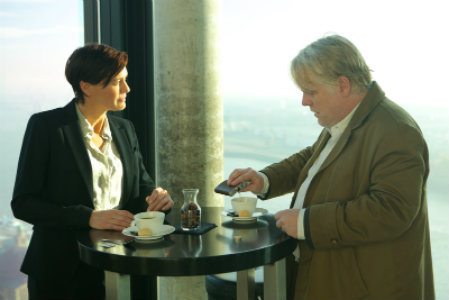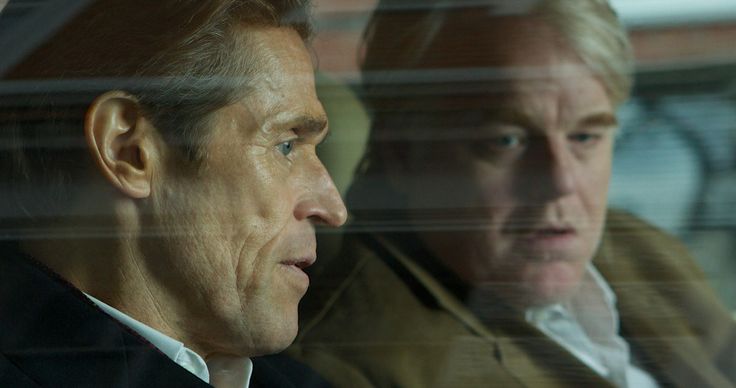A Most Wanted Man
Director: Anton Corbijn
Cast: Philip Seymour Hoffman, Rachel McAdams, Robin Wright, Willem Dafoe
Length: 122 min
Country: UK, USA, Germany
With another adaptation, it is becoming clear that John le Carré‘s novels make great thrillers. A Most Wanted Man bears resemblance to Tinker Tailor Soldier Spy in the sense that both have dense plots which form complex puzzles, and both stay well away from becoming cliché. As a challenge to the post 9/11 approach to terrorism, A Most Wanted Man works well in displaying the severe problems of the American method. The gradual and methodical plot, showing an alternative to the ‘eliminate now ask questions later’ method of dealing with terrorism which is undermined by system it tries to alter, is a stern analysis of Global War on Terror.
As Philip Seymour Hoffman’s swan song, the slow pace and step-by-step plot-line of A Most Wanted Man provides an appropriately complex character with which Hoffman can show off the skills which gave him such a brilliant reputation. The film sees Hoffman play Günther Bachman, a character full of blatant dislike for a system which approaches the post 9/11 global terror situation without consideration, mercy, or understanding. We observe Bachman methodically and carefully planning throughout the film, which serves as a stark contrast with the quick resolution. There are many scenes in which Bachman is deep in thought; solitary and sombre whilst drinking whiskey with a cigarette in hand. The clink of an ice cube in a glass is a sound so frequently heard, it probably deserves to be included in the soundtrack. It has to be said that Hoffman appears dishevelled and unwell, which makes it difficult to disassociate the tragic circumstances of the actor from the character.
As Philip Seymour Hoffman’s swan song, the slow pace and step-by-step plot-line of A Most Wanted Man provides an appropriately complex character with which Hoffman can show off the skills which gave him such a brilliant reputation.
Nonetheless, for all the solitary Hoffman scenes, the conversations between Günther Bachman and US Intelligence agent Martha Sullivan (skilfully played by Robin Wright of the US House of Cards and Forrest Gump) are packed full of tension hidden behind unruffled veneers. Their few meetings dotted throughout the film may at first feel like a sub-plot, in which Sullivan is a mildly interested yet clearly powerful third-party, however in actual fact it proves to lead to the defining moment of the film. Sullivan’s presence at the end (a mere few seconds of her gazing at the distraught loser, Bachman) is telling; her calm, and slightly smug exterior which House of Cards fans will recognise instantly, hardly varies. It has no need to; the audience is made aware that her victory was never going to be questioned.
Other commendable performances in the film came from Willem Dafoe, Rachel McAdams, and the stony faced Grigoriy Dobrygin, as Issa Karpov, a Chechen refugee. It would be possible to denounce Dobrygin’s performance as wooden and without development, however, it is important to note that it is the ability to initially appear suspicious and then become an underdog without altering character which Dobrygin does so well. At the risk of appearing grandiose, it could be said that the friendship between the immigration lawyer Annabel Richter (McAdams) and Karpov, which involves goodwill and deception with positive intent, is representative of the alternative approach to counteracting terrorism and communicating with terror suspects.

Sullivan’s presence at the end (a mere few seconds of her gazing at the distraught loser, Bachman) is telling; her calm, and slightly smug exterior which House of Cards fans will recognise instantly, hardly varies. It has no need to; the audience is made aware that her victory was never going to be questioned.
Anton Corbijn’s experience in directing music videos is certainly put to good use in A Most Wanted Man, particularly in the preparation for the resolution scene. This is the haunting (though admittedly, fairly bizarre) scene in which Bachman sits and plays a melancholy tune on the piano, which overlays the beginning of the end of the film. The slow, deliberate piece does not prepare the viewer for the finalé, which quickly snatches any hope of a satisfying, methodical denouement which A Most Wanted Man gave the audience every right to expect. The ending forms an abrupt interruption to the pacing of the film, which reflects how Günther Bachman’s incredibly well thought out plan is interrupted by what is believed by some to be the most efficient form of justice.


Comments (1)
Fascinating review. This film is definitely on my ‘must see’ list!